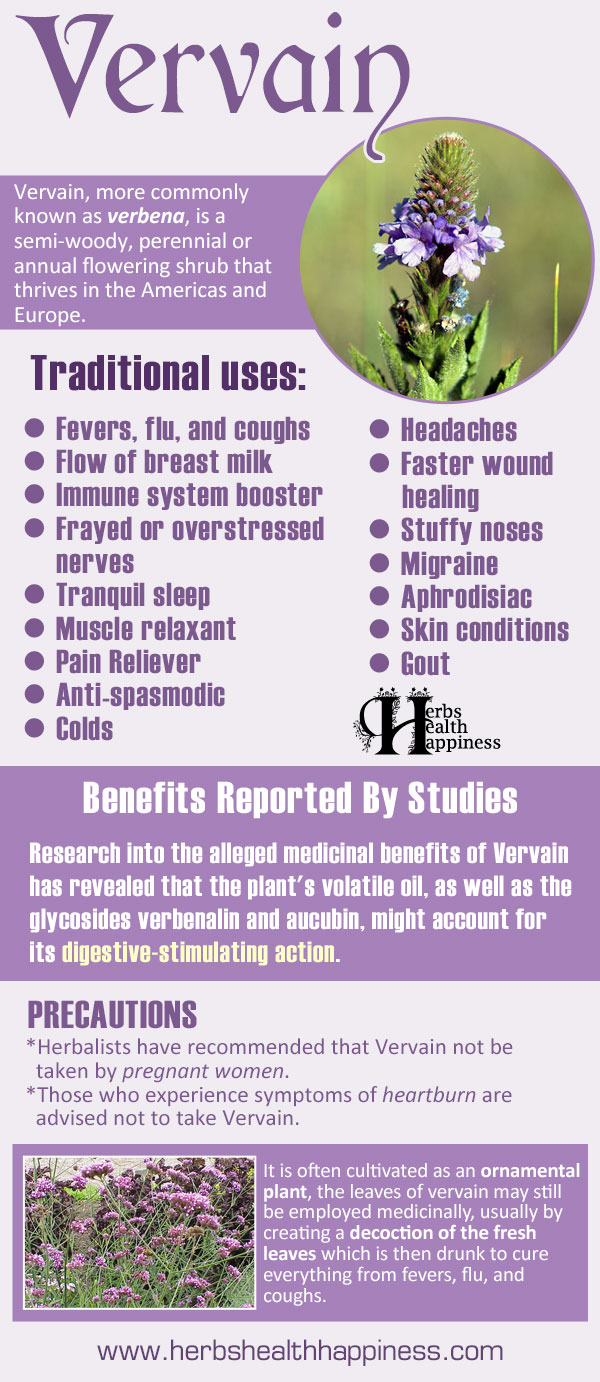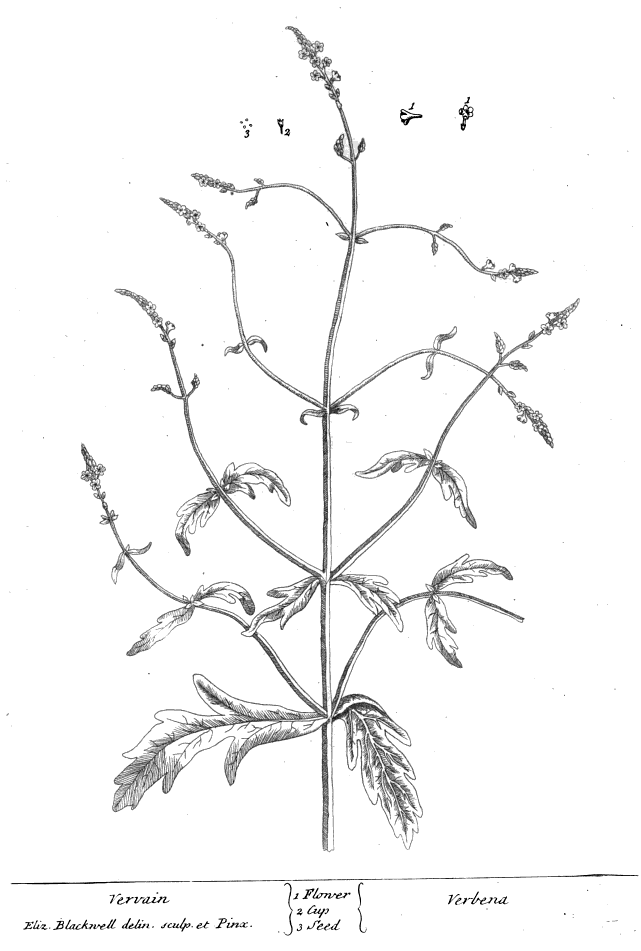Vervain

Vervain Uses and Benefits - image to repin / share
Infographic: herbshealthhappiness.com. Image credits: See foot of article

Other names for Vervain, Past or Present
English - Vervein, Verbena, Simpler's joy, Holy Herb, Devil's Bane, Ironwort, Iron Grass, Frogfoot, Mercury's moist blood, Pigeons' grass, Sagmina, Columbine
Latin - Verbinaca, Peristerium, Verbenaca supina
German - Fisencraut
Chinese - Ma Bian Cao
Japanese - Bijouzakura
French - Vervaine masse
Spanish - Verbena, Berbena
Dutch - Yserkruyd
Italian - Verminacola, Hierba Della Cruz (lit. 'Herb Of The Cross')
Vervain - Botany
Vervain, more commonly known as verbena, is a semi-woody, perennial or annual flowering shrub that thrives in the Americas and Europe. Characterised by its small, hairy leaves, and bluish or purplish five-petaled flowers, it is typically grown (in these modern times) as an ornamental plant. It is among the most common garden varietals found today, chiefly because of its quaint and charming floral displays and its relative hardiness – as the small, somewhat unassuming plant is all but resistant to drought, and need very little sunlight to thrive and be at its best.
Vervain - Herbal Use
Vervain is thought to have been used for centuries as a treatment for colds, skin condition, nervous disorders, and gout. Considered to have stimulant, astringent, diuretic, and diaphoretic properties, Vervain has also been referred to as a muscle relaxant, pain reliever and anti-spasmodic. [1]
While nowadays, it is often cultivated as an ornamental plant, the leaves of vervain may still be employed medicinally, usually by creating a decoction of the fresh leaves which is then drunk to cure everything from fevers, flu, and coughs.
Brewed as a mild tisane via infusion (in this case, dried leaves are employed), it makes for a perfect relaxing drink as well as a general tonic said to strengthen the immune system. Despite having a somewhat inferior aroma to its relative lemon verbena, vervain possesses some, if not all of the medicinal properties of the former. When used in combination with mint or dill, it makes for a perfect pick-me-up, especially during, and after suffering from a bout of flu. Its expectorant properties make it useful for individuals who experience whooping or wheezing coughs, while moderate consumption of vervain tisanes help to settle the stomach and soothe frayed or overstressed nerves. [4] When combined with passionflower, small dosages help to promote tranquil sleep, while a decoction of the roots helps for the management of gout. [5]
The essential oil of the leaves may even be extracted and employed for aromatherapy usually as a sedating or soothing scent, or, if mixed with a base oil, would be perfect as a massage oil to help soothe headaches, migraine, and stuffy noses. The essential oil of vervain may even be used to flavour alcoholic beverages, as is common in the France in some parts of the Mediterranean, while traditional sources attest that the oil of vervain is the perfect means to facilitate faster wound healing. [6] Its essential oil is also used in perfumery as a preservative and 'aroma-enhancer', much like orris root.
Vervain is mentioned in Eclectic texts as having a tonic effect on the uterus.[2] At present, the plant is sometimes used to treat cases of dysmennorrhea and other conditions related to menstruation. Also thought to increase the production of breast milk, Vervain has been described as having the potential to bring about uterine contractions. For this reason, herbalists have recommended that Vervain not be taken by pregnant women.[1]
The bitter leaves of the Vervain plant are thought to stimulate the production of digestive enzymes.[2] The plant has been considered useful in cases of low stomach acidity, but those who experience symptoms of heartburn are advised not to take Vervain.
In Germany, Vervain has traditionally been used in combination with gentian root, primrose flowers, sorrel herb and elder flowers, as a treatment for sinusitis. Today, this remedy is generally prescribed as a complement to conventional treatment.[3]

Vervain - Scientific Studies
Research into the alleged medicinal benefits of Vervain has revealed that the plant's volatile oil, as well as the glycosides verbenalin and aucubin, might account for the its digestive-stimulating action. [1]
In contemporary literature regarding the medicinal benefits of herbs, Vervain is described as having the potential to treat anxiety, depression, and associated symptoms such as migrane, exhaustion, and irritability.[1] However, these claims have not been validated according to modern science.
Vervain - Esoteric Uses
Vervain has been employed by practicing herbalists or folkloric healers and neo-shamans as a medicinal plant. The history of its use as a medicine dates back to the time of the Ancient Egyptians. Among all medicinal plants within the sphere of European or Western usage, vervain is arguably among the most magickal or magickally oriented, often being coupled with various associations with the occult or the arcane, both medicinally, and esoterically. While it is no longer as commonly employed medicinally as it was some five hundred or six hundred years ago, many herbalists still place much stock in vervain despite the fact that its therapeutic range only includes very minute ailments. The true usage of vervain these days lie in the magickal community, which employ it as both a medicine and an integral ingredient for many a spellworking.
The earliest usage of vervain lay in the esoteric and the magickal, with its use traceable to as far back as the time of the Ancient Greeks, where it was a choice herb for offerings and sacrificial incense. While some historians of magick attest that the Greeks burn 'verbana' – a mixture of sundry herbs thought to be pleasing to their gods, there is sufficient anecdotal evidence that points out that both vervain (the plant) and verbena (the herbal mixture) were employed as such, with perhaps equal favour by the Greeks, and subsequently, the Romans.
In folkloric medicine, especially in Italian and Greek folk medicine (it may be suggested that this should be understood as within the context of 'magickal' medicine), the leaves of vervain is even said to act as a galactogogue, or a substance that increases the flow of breast milk. Other folkloric practices employed very strong decoctions of vervain leaves, and even its roots as a primitive abortifacient, while milder dosages were thought to act as aphrodisiacs when drunk by males. [4]
Magickally, vervain is highly useful as a protection herb, as it effectively acts like an instant 'hexing bottle' (sans the bottle, of course), that defends the bearer from all types of malignant intentions and spells. When combined with dill and rosemary, it is said to be a foolproof way to keep bad witches at bay, while an incense of its leaves, flowers, and root is said to exorcise all types of evil entities (earning it the name 'Devil's bane). This is made more effective with the addition of frankincense and dragon's blood resin, as well as rosemary sprigs and St John's wort. It's reputation as a protective, healing, and 'holy' herb is further attested in Christian folkloric tradition, where it is said that vervain was employed to staunch the wounds of the dead Christ after he was taken drown from the Cross. In Italian folk witchcraft or Stregheria, vervain is a feared plant as it can be used to create charms that protect one from any kind of spellwork, while ceremonial magick attributes a special property to vervain that makes it essential for creating charms and for enhancing the power of potions or spells involving mandragora (mandrake root). Vervain is sometimes even added to jujus, gris-gris, or medicine pouches as a protection herb, usually for infants or children, but also for people who are prone to negativity or that have been targeted by ill-intentioned spellweavers. In shamanic practices, especially Native American shamanism, vervain is usually mixed with entheogenic herbs to enhance its efficiency and potency – a practice common among the Pawnee and the Hidatsa. [6]
Vervain in old Herbals & Pharmocopœia
Elizabeth Blackwell's "A Curious Herbal" (1751): 1. It grows to be two foot high, the stalks are a purplish brown, the leaves a willow green and the flowers pale purple. 2. It grows in highways, near towns and villages, flowering in July. 2. The whole herb is used, being accounted cephalic, good against diseases arising from cold and phlegmatic causes. Some commend it to open obstructions of the liver and spleen, help the jaundice and gout. Outwardly it is esteem'd vulnerary, good for sore watery inflamed eyes.
William Thomas Fernie - "Herbal Simples" (1895): VERBENA - The Verbena, or Common Vervain, is a very familiar herb on waste ground throughout England, limited to no
soil, and growing at the entrance into towns and villages, always within a quarter of a mile of a house, and hence called formerly the Simpler's joy. Of old, much credit for
curative virtues attached itself to this plant, though it is without odour, and has no taste other than that of slight astringency. But a reputation clings to the Vervain
because it used to be held sacred, and was employed in sacrificial rites, being worn also around the neck as an amulet.
It is a slender plant with but few leaves, and spikes of small lilac flowers, when wild; but its cultivated varieties, developed by the gardener, are showy plants, remarkable
for their brilliant colours.
The name Frogfoot has been applied to the Vervain, because its leaf somewhat resembles in outline the foot of that creature. Old writers called the plant Verbinaca and
Peristerium.
The practice of wearing it round the neck became changed from a religious observance to a medicinal proceeding, for which reason it was ordered that the plant should be
bruised before being appended to the person; and thus it gained a name for curing inveterate headaches. Presently also it was applied to other parts as a cataplasm.
Nevertheless, the Vervain has fallen of late years into disuse as a British Herbal Simple, though a pamphlet has recently appeared, written by a Mr. Morley, who strongly
advises the revived use of the herb for benefiting scrofulous disease.
Therein it is ordered that the root of Vervain shall be tied with a yard of white satin ribband round the neck of the patient until he recovers. Also an infusion and an
ointment are to be prepared from the leaves of the plant.
The expressed juice of Verbena will act as a febrifuge; and the infusion by its astringency makes a good lotion for weak and inflamed eyes, also for indolent ulcers, and as a
gargle for a relaxed sore throat. The Druids gathered it with as much reverence as they paid to the Mistletoe. It was dedicated to Isis, the goddess of birth, and formed a
famous ingredient in love philtres.
Pliny saith : "They report that if the dining chamber be sprinkled with water in which the herb Verbena has been steeped, the guests will be the merrier."
Geoffrey St. Hilaire and Pasteur praise the Vervain much as beneficial against ailments of the hair, the fresh juice being especially used.
Other names of the plant are Juno's tears, Mercury's moist blood, Pigeons' grass, and Columbine - the two latter being assigned because pigeons show a partiality for the
herb.
Verbena plants were named Sagmina, of old, because cut up by the Praetor in the Capitol.
Vervain Illustration

Vervain
References:
[1] https://www.herbs2000.com/herbs/herbs_vervain.htm
[2] Vervain: Alternative Medicine. Peace Health. https://www.peacehealth.org/xhtml/content/cam/hn-2180001.html
[3] Crellin, John K. and Jane Philpott. A Reference Guide to Medicinal Plants: Herbal Medicine Past and Present. 1989. Duke University Press.
[4] https://en.wikipedia.org/wiki/Verbena
[5] https://www.bigelowtea.com/health/articles/benefits-of-lemon-verbena.aspx
[6] https://www.perception9.com/paranormal-reference-library/natural-world-magick.php?ref=Vervain&item=00000154"
Main article researched and created by Kelsey Wambold and Alexander Leonhardt,
© herbshealthhappiness.com
Infographic Image Sources:
https://en.wikipedia.org/wiki/File:Verbena_stricta_NPS-001.jpg
https://en.wikipedia.org/wiki/File:Verbena_bonariensis2.jpg
(Creative Commons)


1. Famous Chef Sheds 60lbs Researching New Paleo Recipes: Get The Cookbook FREE Here
2. #1 muscle that eliminates joint and back pain, anxiety and looking fat
3. Drink THIS first thing in the morning (3 major benefits)
4. [PROOF] Reverse Diabetes with a "Pancreas Jumpstart"
5. Why Some People LOOK Fat that Aren't
6. Amazing Secret Techniques To Protect Your Home From Thieves, Looters And Thugs
7. The #1 WORST food that CAUSES Faster Aging (beware -- Are you eating this?)
If you enjoyed this page:


























